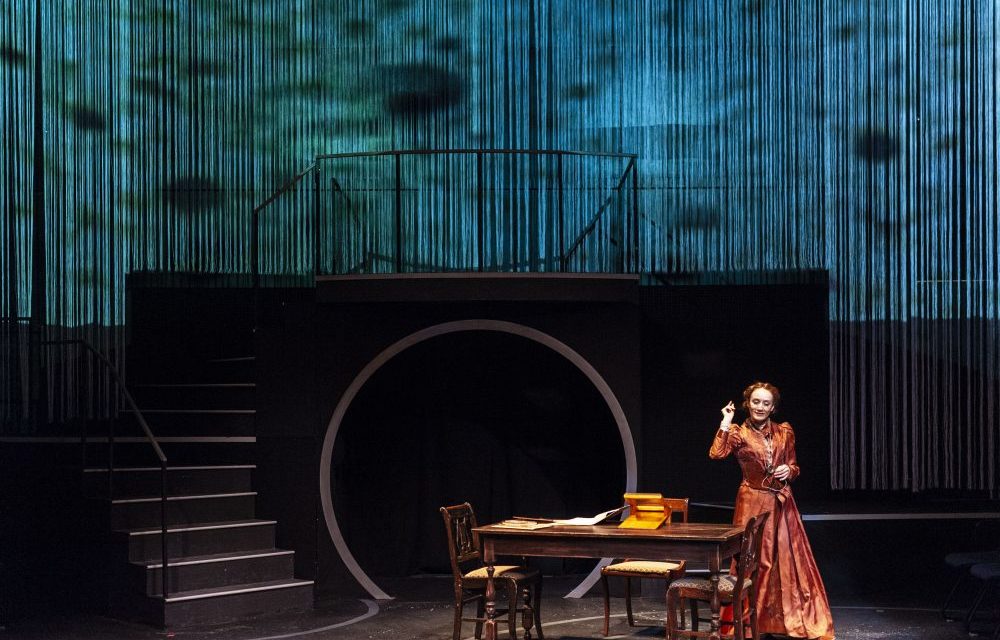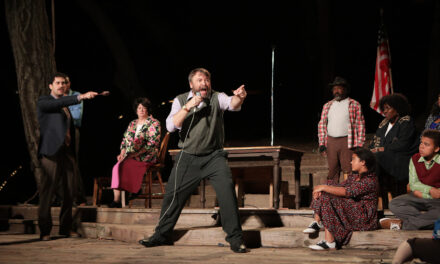The Women Who Mapped the Stars is a new work by Joyce Van Dyke, a rising dramatist with several awards to her credit. Her three previously produced plays also focus on women’s lives. When The Woman Who Mapped the Stars opened at the Central Square Theatre in Cambridge, her fifth piece premiered in New York.
The play tells the story of five of the women “computers” who worked at the Harvard Observatory beginning in the late nineteenth century. This was a period in which great strides were being made in astronomy with the aid of better telescopes and the invention of the camera. Professor Edward Charles Pickering who headed the observatory without sufficient funding decided he needed more help in collecting data, i.e. to study the photographic plates and compute the properties of the stars. In order to save money, he hired his maid, Williamina Fleming (Becca A. Lewis), a hard-working Scottish woman. Since she proved herself capable of dealing with the “boring” side of the work, he decided to employ more women, paying them half the salary a man would earn for the same task.
At the opening, a pregnant Williamina Fleming wearing a nightgown mourns her husband’s disappearance. Cecilia Payne (Amanda Collins) appears on top of the upstage set piece in the light of the stars clad like a flapper in a short striped skirt and a blouse, her hair bobbed with bangs. The two women represent the beginning and the end of the computers.
Three nineteenth-century women enter and set up a large desk that represents their workspace where they labor six days per week. (Scene changes are made by actresses.) Despite her diligence and interest in astronomy Williamina is limited to overseeing new unseen female computers. The characters that arrive later are educated. By the 1880s women’s colleges in the northeast of the United States had been established. Antonia Maury (Christine Power), a Vassar graduate, is spunky and clever. Henrietta Swan Leavitt was a Radcliffe graduate who later fell ill and lost much of her hearing. Actress Sarah Oakes Muirhead wears a hearing aid throughout. Annie Jump Cannon (Sarah Newhouse) studied astronomy and physics. She too suffered hearing loss because of an illness and wore a hearing aid, also unmentioned. At one point during the play, Sarah Newhouse adjusts it. Like all of the college trained characters, Cannon made an important contribution to astronomy despite not being permitted to use a telescope which was considered a male privilege.
Although the material is interesting it becomes repetitive since very little happens. The women are resentful that they are underpaid and have circumscribed careers. Nevertheless, they enjoy each other’s company. They imagine that in the not too distant future, men and women will receive equal pay. Change comes in 1923 with the arrival of the time traveling Celia Payne (Amanda Collins), a British would-be astronomer who attended Cambridge University and is seeking the support of her predecessors. Although it is now 1923, the computers are wearing the long dresses of the late nineteenth century, their hair still piled high.
Cecilia Payne eventually achieves her goal but not without a lot of difficulty on the way. The play comes to a satisfactory and moving ending.
The acting is excellent and each character distinct. Amanda Collins and Williamina Fleming handle their respective accents with skill.
Seif Allah Salotto-Cristobal’s projections of the night sky are beautiful as is John R. Malinowski’s lighting. Chelsea Kert’s colorful costumes are both surprising and attractive. They reveal the characters’ spunk.
Director Jessica Ernst’s blocking is limited since she chose to have the characters spend most of their time seated around the desk as seen in photos taken of the actual computers. Sometimes, the desk is upstage right and sometimes it is carried downstage. On a few occasions, she directed an actress to interact with the audience as at the beginning when Sarah Newhouse shares an oatmeal raisin cookie with a spectator. It enlivened the moment.
The Women Who Mapped the Stars continues at the Central Square Theatre until May 20.
Playwright: Joyce Van Dyke
Director: Jessica Ernst
Scene Designer: James F. Rotondo III
Costume Design: Chelsea Kerl
Lighting Designer: John R. Malinowski
Sound Designer: Lee Schuma
Projections Designer: SeifAllah Salotto-Cristobal
Cast: Amanda Collins, Becca A. Lewis, Sarah Oakes Muirhead, Sarah Newhouse, Christine Power
This article originally appeared on Capital Critics’ Circle on April 28, 2018 and has been reposted with permission.
This post was written by the author in their personal capacity.The opinions expressed in this article are the author’s own and do not reflect the view of The Theatre Times, their staff or collaborators.
This post was written by Jane Baldwin.
The views expressed here belong to the author and do not necessarily reflect our views and opinions.

















